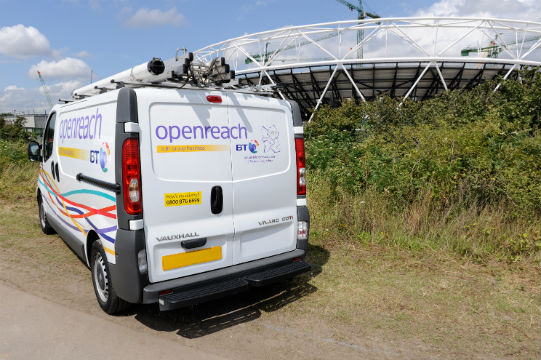BT To Invest Another £50m In Urban Fibre Rollout

BT to connect 400,000 more homes and businesses across 30 cities to its fibre network
BT is to invest a further £50 million into its fibre rollout in the UK, allowing 400,000 additional premises in 30 cities that were not included in its original commercial deployment to benefit from superfast broadband.
The funding will be used to connect cabinets not originally earmarked for upgrades due to technical challenges or local planning restrictions, along with those serving apartment blocks, as well as to deploy fibre to the premises (FTTP) to new buildings in urban areas.
The former state monopoly is already investing £2.5 billion in its fibre network in the UK and so far, it has won all of the government funding from the £530 million Broadband Delivery UK (BDUK) initiative aimed at extending coverage to areas considered commercially unviable.
BT fibre investment
 “Our fibre programme is going extremely well with our engineers connecting homes and businesses across the UK,” said Mike Galvin, managing director of network investment at BT Openreach. “Some city areas have proved challenging in the past but we are returning to those and will pass hundreds of thousands of additional premises with fibre.
“Our fibre programme is going extremely well with our engineers connecting homes and businesses across the UK,” said Mike Galvin, managing director of network investment at BT Openreach. “Some city areas have proved challenging in the past but we are returning to those and will pass hundreds of thousands of additional premises with fibre.
“We are reaching vast swathes of rural Britain with our public sector partners but we will upgrade these city areas under our own steam. Businesses in cities already have access to ultra-fast speeds but fibre will give them greater choice.”
BT says its Openreach fibre network now connects 18 million homes and businesses – a figure which will expand as its commercial rollout continues and more BDUK projects go live. It adds that five million people currently receive fibre Internet in the UK, placing it ahead of European rivals in terms of adoption levels and closing the gap on the US and Japan.
The government’s eventual target for superfast broadband coverage is 98 percent of the population by 2018, and has set aside another £250 million to expand coverage using ‘alternative’ technologies such as mobile to areas not covered by commercial or BDUK-funded rollouts.